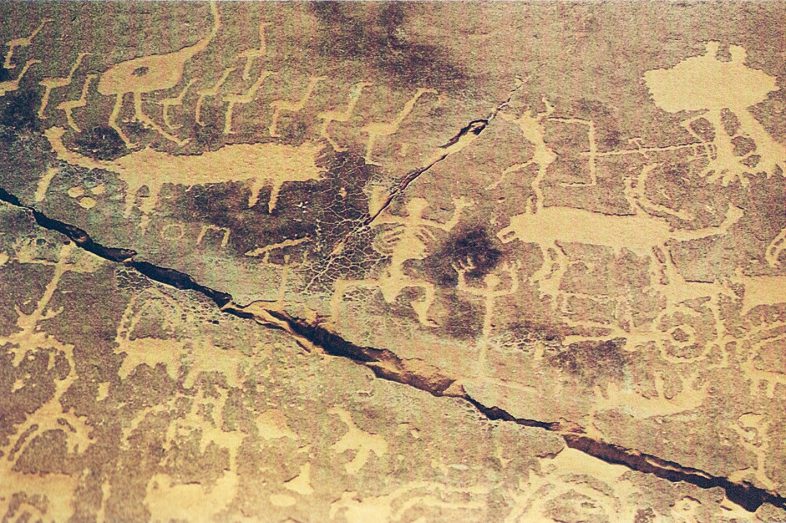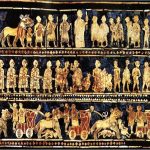The following extensions are found in textal and dialectal Arabic:
1- *KN+b ↣ knb: Modern Arabic provides for the word meanings such as “settees’ and ‘armchairs”. However, knb is related to plants so it could mean just piles of straw or straw mixed with branches.
2- *KN+s ↣ kns: Sweep; m+*KN+s = a broom.
3- *KN+z ↣ knz: In today’s Arabic this word means “a treasure”. In prehistoric times it meant a pile of dates.
4- *KN+f ↣ knf: To live under the protection of, to look after. An obvious reference to looking after the kids and the husband.
5- *KN+d ↣ knd: To cut things to pieces, probably meat or fish as part of cooking a meal.
6- *KN+r ↣ knr: A type of flax that appears to have been woven of small branches and other plant material to make primitive clothes.
7- Related to this word is *KN+ŝ (ŝ = sh), crushed branches for types of early clothes.
8- *KN+th (as in this) but most probably KN+ṣ (ṣ = as ‘s’ in “sub”), exhaustion, heavy work, probably a reference to overworked housewives and mothers.
9- *KN+ʻ ↣ knʻ: some sort of infection or disease that seems to have afflicted mothers and housewives causing hardening of hands and fingers.
Akkadian is rich with entries of *KN:
- kanāku : G. to seal D = G Š. to make seal
- kanānu : G. to roll up, wrap up ; to contract (v.i.), curl up ; to tuck up (garment) D = G ; to contract (v.t.) ; stat. : to be curled up Štn. to bow oneself repeatedly N. to contract oneself
- kanāšu (1) , ḫanāšu : [Government] 1) to bow down , to submit (enemy , worshipper , subject) Gt : be constantly submissive D : to subject ( people , land …) Dt : to be subjected [kišāda kanāšu] : to bow one’s neck , to submit oneself
- kanāšu (2) : [Country → Agriculture] to gather in (people , harvest)
- kanāšu : G. to bow down, submit Gt. stat. : to be constantly submissive D. to subject Dt. to be subjected ŠD = D Š. to make s.o. submit
- kanāšu : D. to gather in (harvest, people)
- kanāzu: to store away
- kandu: jar
- kangiškarakku: a kind of table. Variants : kagiškarakku, kangiškarakku, kanniškarakku, kinnaškarakku
- kaniktu: sealed document
- kanīku: [Legal] 1) sealed document ; clay sealing ; 2) clay sealing ; [kanīkāt šīmātim] : purchase documents ; [bīt kanīkāte] : tablet container , storage place for tablets , archives (?) ; 3) sealing (of jar, door) ; [bēt kanīki] : sealed house ;
- Kāniš: [Humanities → Geography] Kanesh (today’s Kayseri) ;
- kanku: [Government] sealed
- kannu (2): [Clothing] band , binding , hair-band , binding attached to clothing , wrestler’s loincloth , menstrual cloth , binding for sheaf , a kind of trap
- kannu B: [Country → Trees] sprig , shoot
- kannu: [Feeding → Cooking] pot stand
- kannû: to treat kindly , with honour , to accomodate
- kannušu: to gather , to collect
- kanšiš: [Government] submissively
Other linguistic clusters provide a great deal more information about life for women in prehistoric times. Of note is the word ‘kisa’ “clothes”. The root of this extension is *KS “cunt”. Because ‘kisa’ is a straightforward derivative from the root *KS it may be clear that the first or one of the first types of clothes was made to cover the pussy and provide privacy during period times.
Image: Prehistoric carving from Saudi Arabia
Study the image a bit, please. On the right just above the crack there appears to be a small body of a boy (short hair) lying. To his left is probably a woman (a mum?) waving her arms to scare away a wolf or some other beast. She has a smaller body than the man to her left who is also trying to scare away the beasts. Just below the large beast left of the man are two distinct shapes “O’ and what could resembles ‘M’. An etymologist always wonders about these little things, you never know what secret they may reveal.
Last modified: December 30, 2022



